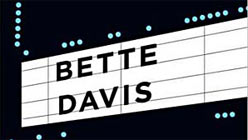When David Thomson brought out The Moment of Psycho a few months back, I quipped that he ought to be careful, lest he condition his loyalists to expect a whole book for each of the 1,000 films he discussed in the recent reference compendium Have You Seen…? And why stop there? While we were at it, why not one book each for all the figures Thomson discussed in his other reference compendium, the seminal New Biographical Dictionary of Film?
Apparently it is not a bother. Of course the prolific London-born San Francisco author has been writing full-length show-business biographies throughout his career, but now he really seems to be humming along. Now Thomson has launched his “Great Stars” series, so far four compact and delicious book-length essays revisiting the lives and films of Ingrid Bergman, Humphrey Bogart, Gary Cooper and Bette Davis.
So here we have four new angles on the cultivation of mystique. New contexts for, among other things, Bergman’s promiscuity, Bogart’s insecurity, Cooper’s passivity and Davis’s determination. With a nimble spring in his step, and his usual poet-historian proclivities, Thomson runs us through his subjects’ formative experiences, their tellingly turbulent family lives, and, not least, their highly varied bodies of work.
Even at his most digressive, he’s forcefully pithy. “What Casablanca discovers,” Thomson writes, “is Ingrid Bergman’s profound aptitude for being a prisoner, for feeling torture and the agonies of indecision.” As for what it discovers in her leading man, there is the important notion that his “rueful gaze and his wary voice were a proper task force to face fascism and to discard neutrality and self-concern.”
“It is time for a reappraisal,” Thomson had said of Bogart in his last edition of the Biographical Dictionary. Well, here it is, and in good company, too. Which is only to say that the author has not squandered or taken for granted the many opportunities this new series provides. Yes, these are stars from another century, all seeming at once long gone and exhaustively well-recorded for posterity. Yet none of these new books feels padded or phoned in; each in its way becomes newly essential.


